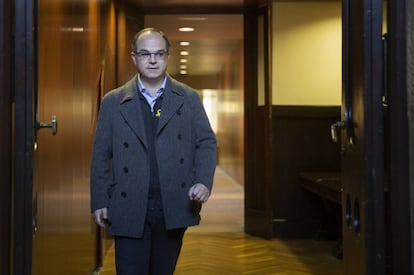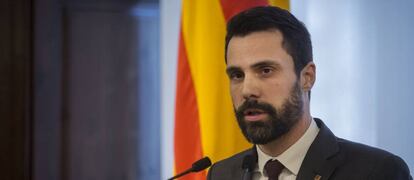Explainer: Will Jordi Turull be sworn in as the next Catalan premier?
Here is an outline of all the possible scenarios that may follow this evening’s investiture ceremony

The Catalan parliament will try to vote in a new premier on Thursday afternoon. The candidate is the former deputy Jordi Turull, a politician who is due to appear tomorrow in the Supreme Court in relation to the failed declaration of independence for the region late last year. In order for the vote to prosper, the pro-independence Together for Catalonia (Junts per Catalunya) and Catalan Republican Left (ERC) parties need four votes from the far-left anti-capitalist party CUP. These are the possible scenarios ahead of the vote.
Does Jordi Turull have the necessary support?
The pro-independence parties are hoping to hold the debate and vote on Thursday afternoon to choose a new regional premier. To be successful, the candidate, Jordi Turull, will need an absolute majority of votes (68 of a total of 135). That would mean the support of Together for Catalonia, ERC and CUP, who hold 70 seats in the parliament after December’s regional elections.
Turull will appear before the Supreme Court on Friday, making his investiture today urgent
But from this total, the votes of ex-premier Carles Puigdemont and former deputy Toni Comín must be subtracted, given that both have fled to Brussels to avoid arrest for their role in the independence declaration, leaving 68 votes. If the CUP opts not to support Turull – the party will meet ahead of the session to decide on its position – the investiture will fail given the opposition deputies number 65 (if all vote no), compared to the 64 that Together for Catalonia and ERC hold. For there to be a second vote 48 hours later, Turull must secure more yes votes than no in today’s ballot. Should there be a second session, a simple majority is sufficient for him to be elected. But the pro-independence parties do not want to see this option, given that Turull could be placed in pre-trial custody on Friday by the Supreme Court before the second ballot can take place.
How long will the session last and how will it work?
After a resolution stating that Turull is the candidate is read out, the session will start with Turull setting out his program as premier, with no time limit. Afterwards, the opposition groups will each have 30 minutes to respond, meaning a potential total of three hours.
If Turull is voted in, there is nothing the government can do about it
Turull can then opt to respond – again, with no time limit. The opposition can then respond during the same time period as he used. If Turull responds to the response, the opposition groups will have a maximum of five minutes to reply. If Turull should initially respond to the opposition as a whole, the groups will have to divide up the time taken by the candidate to respond and will only have one response.
Once the debate is over, deputies will vote individually and verbally.
How have these debates played out in the past?
Given the controversy around the candidature, the debate could last many hours. In January 2016, Carles Puigdemont was voted in as premier after the CUP refused to support his predecessor, Artur Mas, who has been caught up in corruption scandals. The debate on that occasion lasted four hours, 45 minutes.

What is likely to happen in the Supreme Court tomorrow?
Judge Pablo Llarena has called the lawyers for 28 of the people being investigated for possible offenses related to the independence drive to appear in his court in order to notify them of the content of a writ that sets out the facts and offenses attributed to each suspect. This means that most of the investigative stage of the case is now complete; the Friday hearing is a preliminary step before the actual trial begins. The fact that all 28 lawyers have been summoned does not mean that all the suspects will be formally charged with crimes tomorrow: some could be left out of the case, and yet others be charged at a later date.
The judge is sure to start prosecution proceedings for rebellion against the four suspects who are currently in jail (former regional ministers Oriol Junqueras and Joaquim Forn, and one-time pro-independence association heads Jordi Sànchez and Jordi Cuixart), as well as six other former regional deputies (including Turull), and also Puigdemont and the four other ex-regional ministers who fled to Belgium.
Could the judge send Turull to jail?
Turull, as well as the other five aforementioned deputies, were released from custody on bail, after pledging before the judge that they would abide by the Spanish Constitution and abandon the unilateral drive for independence. If the prosecution asks for them to be sent back to jail, and the judge rules that they have reoffended or that there is a clear flight risk, he could lock them up once more.
How will the Spanish government react?
The government was preparing for Turull to be voted in as premier next week, in the knowledge it could do nothing to stop it. The judge’s decision to call these hearings for Friday, and the response of the Catalan parliament speaker, Josep Torrent, to hastily call an investiture session for Thursday, has disrupted these plans. If Turull is voted in, there is nothing the government can do about it, as Popular Party spokesperson Rafael Catalá admitted on Thursday. That said, Article 155 – the part of the Constitution that the central government in Madrid used to suspend the region’s autonomous powers – will stay in place until there is a regional government in Catalonia “in accordance with the law.” If Judge Llarena were to send Turull to prison on Friday, Article 155 would stay in force.
Spain’s justice minister, Rafael Catalá, admitted in a radio interview today that the investiture debate has been called within the bounds of the law, and as such cannot be appealed by the government and halted by the courts. Should the Supreme Court decide to go ahead and charge Turull, “that would not invalidate his premiership,” the minister said. At that point, Turull would still be facing a trial later this year, and the possibility of an adverse verdict that could bar him from holding public office.
Will Spain’s King Felipe VI sign off on Turull’s premiership?
If Turull is voted in as the Catalan premier, the king of Spain will have to sign off on the appointment, the justice minister admitted on Thursday. “Let’s bear in mind that the proceedings of the king are duty, they are formal, there is not an element of will,” Catalá explained. “He doesn’t have to approve it, he just has to ratify the appointment.”
English version by Simon Hunter.
Tu suscripción se está usando en otro dispositivo
¿Quieres añadir otro usuario a tu suscripción?
Si continúas leyendo en este dispositivo, no se podrá leer en el otro.
FlechaTu suscripción se está usando en otro dispositivo y solo puedes acceder a EL PAÍS desde un dispositivo a la vez.
Si quieres compartir tu cuenta, cambia tu suscripción a la modalidad Premium, así podrás añadir otro usuario. Cada uno accederá con su propia cuenta de email, lo que os permitirá personalizar vuestra experiencia en EL PAÍS.
¿Tienes una suscripción de empresa? Accede aquí para contratar más cuentas.
En el caso de no saber quién está usando tu cuenta, te recomendamos cambiar tu contraseña aquí.
Si decides continuar compartiendo tu cuenta, este mensaje se mostrará en tu dispositivo y en el de la otra persona que está usando tu cuenta de forma indefinida, afectando a tu experiencia de lectura. Puedes consultar aquí los términos y condiciones de la suscripción digital.








































